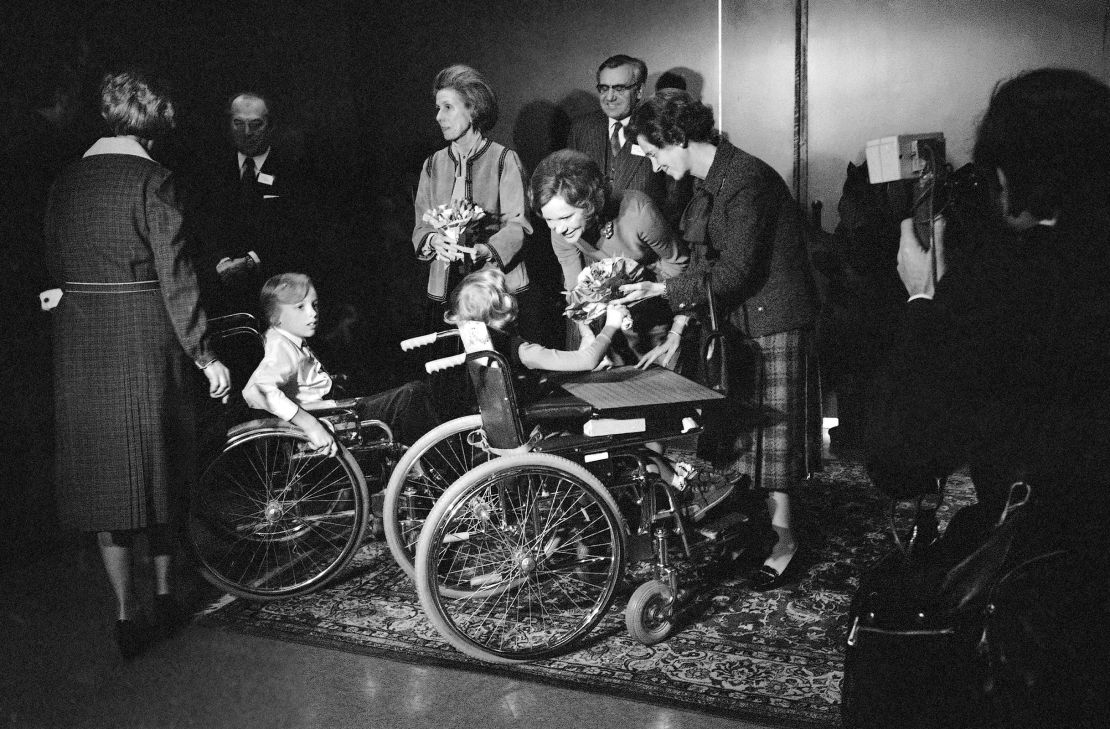Editor’s Note: Carmen Cusido is a mental-health advocate and Cuban American writer based in northern New Jersey. She is working on a memoir about grief and loss titled “Never Talk About Castro and Other Rules My Cuban Parents Taught Me.” The opinions expressed in this commentary are her own. Read more opinion at CNN.
CNN
—
This week, many will gather to remember and offer respects to former first lady Rosalynn Carter, known as a stalwart advocate, a lifelong and inspiring partner to her husband and a legendary humanitarian. I’ll be honoring her in my own way, by paying tribute to the lifetime she dedicated to transforming mental health advocacy. Her unwavering efforts fought stigma, fostered understanding and empowered countless individuals like me who face mental health challenges daily.
Carter’s mental health advocacy began in Georgia in the 1960s and was driven by a commitment to addressing the stigma and resource gaps in mental health support. As first lady, in 1977, Carter made it her signature cause, notably through the creation of the President’s Commission on Mental Health. Her efforts resulted in increased research funding, broader treatment access and innovative approaches to mental health care.
Her efforts brought much-needed attention to the issue, emphasizing that mental health is a treatable medical condition, no different than a physical ailment. For many of us who have struggled with depression, anxiety or other mental health illnesses, the former first lady’s advocacy was a beacon of hope, reminding us that we are not alone and that there is help available.
While Carter’s activism has played a crucial role in raising awareness and reducing stigma, the pervasiveness of mental health disorders remains undeniable.
A recent study led by researchers from Harvard Medical School and the University of Queensland found that half the world’s population will experience at least one mental health disorder by the age of 75. This conclusion stems from comprehensive face-to-face surveys of over 150,000 adults across 29 diverse countries representing all regions in the world.
The staggering economic toll of mental health disorders, as highlighted by the World Health Organization’s estimate of 12 billion lost working days and a $1 trillion productivity loss annually, serves as a stark reminder of the profound personal and societal implications of these conditions. My personal journey as a 40-year-old Cuban American who has battled depression since 13, and faced the profound impact of mental illness firsthand, exemplifies the human cost of these invisible struggles.
Following my mother’s death in 2019, I attempted suicide and was briefly hospitalized. Since that day almost five years ago, I’ve worked hard to manage my depression. I’ve tried therapy, antidepressants and meditation to help alleviate my symptoms. While these methods have been helpful, my illness has still had a profound impact on my life. There are times when I feel like I have everything under control. I could have a marathon day, filled with time-sensitive work deadlines, and end my day with high-intensity exercise. And there are other times when I consider it a victory just to get out of bed, shower and have breakfast.
However, one of the most challenging aspects of living with depression has been dealing with persistent judgment and misunderstanding surrounding the condition. My illness has been weaponized by people I love who sadly didn’t know better. They’ve used words like “crazy” to resurrect a tired, old trope about people with mental health illnesses. It’s exhausting to constantly feel like I’m being targeted for something that is out of my control.

Others have dismissed my struggles and have told me to “just get over it” or accused me of being weak. It begs the question: Would you ask a person with diabetes, asthma or any other condition to “just get over it”? At best, the statement is misguided and uninformed. At worst, it’s cruel. While I speak up about how these comments are inappropriate and hurtful, others with mental health illnesses may not seek the help they need for fear they’ll be further stigmatized.
The depths of despair I’ve experienced during my battle with depression have made me acutely aware of the urgent need for comprehensive mental health care. This awareness echoes the driving force behind Carter’s lifelong dedication to improving mental health outcomes.
Get Our Free Weekly Newsletter
While we’ve chipped away significantly at the stigma associated with mental health disorders, there’s a lot more that needs to be done.
I’m grateful to Rosalynn Carter for her tireless efforts. All of us must continue to build on her legacy by raising awareness, expanding access to quality treatment and promoting understanding and empathy. As Carter once said, “If only we could consider mental illnesses as straightforwardly as we do physical illnesses, those affected could seek help and be treated in an open and effective way.”
If you or someone you know is struggling with suicidal thoughts or mental health matters, please call the 988 Suicide & Crisis Lifeline by dialing 988 to connect with a trained counselor, or visit the 988 Lifeline website.
Credit: Source link




